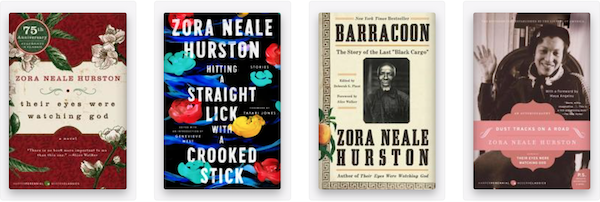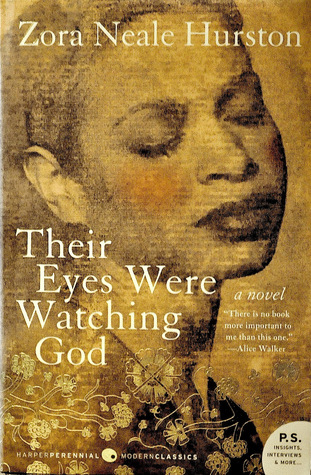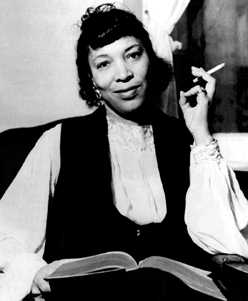The Gilded Six-Bits by Zora Neale Hurston (1933)– an analysis
By Sarah Wyman | On June 19, 2018 | Updated December 6, 2020 | Comments (0)

In “The Gilded Six-Bits,” a short story, as well as her other works of fiction and essays, one sees Zora Neale Hurston’s wide scope as a writer.Following is an analysis of “The Gilded Six-Bits,” and you can read the full text of the story here.
Hurston was a key player in the Harlem Renaissance. She took on various topics from marital bliss to the national welfare, writing as a gifted author of fiction, a knowledgeable anthropologist, and a rigorous critic.
Always unconventional, she struck many as overly conservative, as she actually promoted southern segregation for a while, arguing that forced integration was an insult to the African-American community.
She died penniless and nearly forgotten. Alice Walker (author of The Color Purple) receives credit for tracking down Hurston’s lost grave and bringing her celebrated works back into the public eye.
Today, Hurston is probably the most famous writer from that movement (along with Langston Hughes) and in the same league as Toni Morrison as a highly acclaimed black woman author. She published her canonical novel Their Eyes Were Watching God in 1937.
In Zora Neale Hurston: A Literary Biography, Robert E. Hemenway encapsulates this story:
“The Gilded Six-Bits” is one of Hurston’s best short stories, an ironic account of infidelity and its human effects. A young Eatonville wife, Missie May, is seduced by a traveling Lothario whose main appeal is a gold watch charm. He promises her this gold coin, but at the moment of submission they are discovered by her husband, Joe.
The cheapness of the affair and the tarnish of the marriage is represented by the coin Left behind — instead of a ten-dollar gold piece it turns out to be only a gilded half-dollar. Joe cannot verbalize his grief and Missie May cannot articulate her sorrow, but they work together during the next year to recapture their love, growing together again after the birth of their first child — who strongly resembles Joe.
The story ends as Joe goes to the white man’s store to buy his wife some candy kisses a symbol of his forgiveness, paying for the purchase with the gilded six bits as a reminder of her infidelity.”
. . . . . . . . . .
Their Eyes Were Watching God (1937)
. . . . . . . . . .
The story of a ritual of love
In “The Gilded Six-Bits” (1933), Missie May and Joe carry out a playful ritual of tossing the week’s pay in silver coins down the hall and hiding candy kisses in pockets, solidifying their connection and expressing their deep affection for one and other. Their bond is strengthened each week by this predictable game of hide-and-seek that ends with sweetness and a “rough and tumble.”
Both characters are entranced by an outsider, a glamorous, if physically unappealing man who comes into town dripping with gold that proves to be nothing but gilded, nearly worthless coins.
The destruction Otis D. Slemmons wreaks on their marriage nearly drives Missie May and Joe apart permanently. Motifs of light, silver coins, the gilded “gold” coin, candy kisses, and the laugh, take on special meaning and hold this story together.
A simple, linear plot line and vernacular language
Hurston, like the poet Paul Lawrence Dunbar, was celebrated for writing what people considered an authentic, African-American version of English. Thus, an invaluable aspect of black culture was preserved and publicized. Writing this way could be both a gift and a liability.
When this one expressive mode was promoted or required by publishers at the exclusion of African-American works in “standard” English, this fed stereotypical depictions of an entire race and restricted the freedoms of black writers to express themselves however they wished.
The simple, linear plot and the vernacular language mask the complexity of Hurston’s text. When Joe claims, “Ah know Ah can’t hold no light to Otis D. Slemmons,” he foreshadows the awful moment when, coming home early from work, he will illuminate, with a match, the scene of betrayal in which he finds Missie May and Slemmons in bed together.
. . . . . . . . . .
Analysis of “Sweat” by Zora Neale Hurston
. . . . . . . . . .
Omniscient narration
The omniscient narration reveals much more of Joe’s thought and motivation than it does Missie May’s. Walking home from work where “a lean moon rode the lake in a silver boat,” Joe craves fatherhood and imagines Missie May “making little feet for shoes.”
Hurston also incorporates biblical references, authenticating the discourse community she illustrates. Within the linear narration, whole stories open up with a shared set of illusions: “Ah could… drink Jurdan [river] dry.” Bringing a comic edge to a scene of tragedy, Hurston uses the mock-heroic mode with her high-flying diction: “The great belt on the wheel of Time slipped and eternity stood still.”
This sounds as though the narrator describes the epic world of Greek gods (at a mechanic’s shop) instead of a mundane scene of adultery. In a similar metaphorical depiction of the agonies of time, Hurston writes, “The hours went past on their rusty ankles” (94) as Joe and Missie May live through the excruciating crisis in their marriage.
This apparently straightforward story holds various ambiguities. Why did Missie May betray Joe, after all? Was it for money for Joe, a lust for gold, or naive curiosity about an outsider? Was Missie May as lowly as her mother-in-law believed her to be? Did she “fan her foot” (flirt) like her own disreputable mother? Hurston complicates the tale with her open-ended approach.
. . . . . . . . . .
What White Publishers Won’t Print by Zora Neale Hurston
. . . . . . . . . .
Dismantling stereotypes
Through her story, she has dismantled the racist stereotype of the “happy darky” by presenting Joe, a fully drawn, complex character, deeply in love with his wife, somewhat flawed in his vindictive impulses (when he leaves the coin under her pillow as though she were a prostitute), who deals with a horrible situation.
She has delivered what William Faulkner demands in his 1950 Nobel Prize for literature address, stories of “the human heart in conflict with itself.”
In “The Gilded Six-Bits,” Zora Neale Hurston offers a story of normal, African-American people dealing with typical human concerns of intimacy, hope, betrayal, and forgiveness. Their dilemmas are universal, in that people from any culture, ethnicity, state of health, sexual orientation, profession, fashion category, or social class, etc., can relate to them.
Hurston’s story is just the type of literature she calls for in her editorial, “What White Publishers Won’t Print” (1950) published in , I Love Myself When I am Laughing…And Then Again When I am Looking Mean and Impressive, edited by Alice Walker (Feminist Press, 1979).
In this article, she argues that U.S. publishing companies only publish books by African-Americans that “treat the race problem.” Why? Well, because stories of racial tension sold well in the 1950s just before the rise of the Civil Rights movement.
Hurston argues, in a risky and provocative way, that these typical texts promote negative stereotypes of African-Americans and other non-white segments of the population.
The lack of knowledge that North Americans have about each other is deeply divisive, truly a national crisis when post-WWII U.S. needed to come together. She warns, “Man, like all the other animals fears and is repelled by that which he does not understand, and mere difference is apt to connote something malign.”
. . . . . . . . . .

Zora Neale Hurston books on Bookshop.org*
Zora Neale Hurston page on Amazon*
. . . . . . . . . .
The question of race
Hurston demands, “For the national welfare, it is urgent to realize that the minorities do think, and think about something other than the race problem.” Her works constitute a marvelous effort to address this need for everyday stories about everyday people who are not white.
At the very end of the story, the question of race does come up, but on Hurston’s terms. Joe resumes the bonding ritual with Missie May by spending his silver coins at the candy store. The white store clerk’s ignorant and stereotypical comment, “Wisht I could be like these darkies. Laughin’ all the time. Nothin’ worries em.”
“Nothin’ worries ‘em,” evokes the “sambo” stereotype of the happy, carefree black man. With great dramatic irony, the clerk enacts the misreading of a stranger while the reader understands that Joe is far deeper than a surface caricature. He has suffered tremendous loss, conflict, and heartache, and is in the process of forgiving his wife, accepting their son, and healing their marriage.
— Contributed by Sarah Wyman, Associate Professor of English, SUNY-New Paltz, © 2018
. . . . . . . . . .

Chad Coleman and Tkeyah Crystal Keymah in the 2001 short film (approximately 30 minutes), The Gilded Six-Bits, based on the story by Zora Neale Hurston. You can watch this film on Vimeo.
References
Zora Neale Hurston, The Complete Stories, Harper, 1995.
Zora Neale Hurston, I Love Myself When I am Laughing…And Then Again When I am Looking Mean and Impressive, edited by Alice Walker (Feminist Press, 1979).
. . . . . . . . . .

You might also enjoy “Spunk” (1925) — Zora’s first published short story
. . . . . . . . . .
*These are Bookshop Affiliate and Amazon Affiliate links. If the product is purchased by linking through, Literary Ladies Guide receives a modest commission, which helps maintain our site and helps it to continue growing!



Leave a Reply